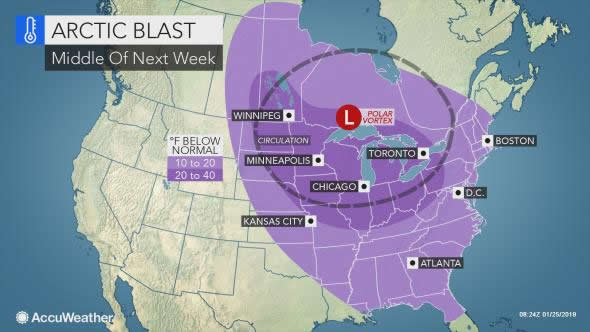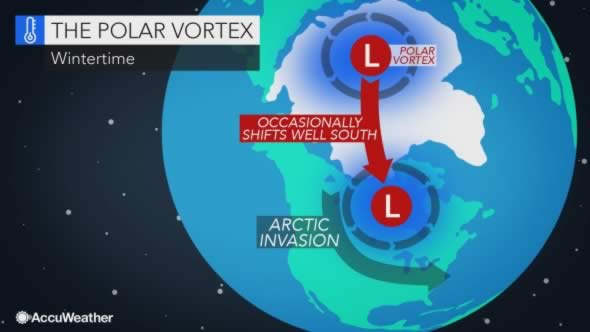
By Kristina Pydynowski, AccuWeather senior meteorologist
AccuWeather-(ENEWSPF)- The colder air plunging back into midwestern and northeastern United States late this week will pale in comparison to the brutal cold expected to end January as the polar vortex plunges south.
“Through late next week, it will be a very cold stretch and high energy draw from the Plains to the East Coast,” according to AccuWeather Lead Long-Range Meteorologist Paul Pastelok.
While the current blast of Arctic air is expected to hold highs to the single digits and teens across most of the Midwest on Friday and Saturday, even harsher conditions can put more people and animals at risk for frostbite and hypothermia during the middle of next week.
“The end of January will bring the coldest air of the season for the Midwest and rival the Arctic blast from earlier this week as the coldest in the Northeast,” Pastelok said.
The polar vortex is expected to become displaced from the Arctic Circle and plunge down to near the upper Great Lakes. That will occur in the wake of the winter storm that may lay a swath of disruptive snow from the Midwest, Chicago included, to a part of the Northeast early next week.
“Temperatures can be held 20 to 40 degrees Fahrenheit below normal across most of the Midwest around the middle of next week,” according to AccuWeather Senior Meteorologist Brett Anderson.
That can equate to one or two days of subzero highs from Fargo, North Dakota, to Minneapolis and Chicago. Highs may reach only the single digits and teens from St. Louis to Indianapolis and Pittsburgh.
“Latest indications are that Chicago could set a record on Wednesday for the day’s lowest high temperature,” according to AccuWeather Senior Meteorologist Tom Kines. Temperatures have not been held below zero for an entire day in Chicago since Jan. 6, 2014.
It is possible that overnight temperatures in Chicago bottom out at minus 16. There has been only two other times this century when temperatures have been that low in the city.

Thursday can be the coldest day in the Northeast, Pastelok said.
“If there is snow on the ground, which I believe there will be, lows in the mid-single digits with highs in the middle to upper teens can be anticipated in New York City and Philadelphia,” he added.
Even if the early-week storm fails to deliver snow to these cities, temperatures can still be held 10 to 20 degrees below normal.
Similar temperature departures are anticipated southward to the Interstate 10 corridor and perhaps into central Florida.
Download the AccuWeather app to see just how cold it will get in your area.
From the Midwest to the Northeast, biting winds ushering in the brutal cold to end January will create dangerously lower AccuWeather RealFeel® Temperatures.
Residents will once again have to take the proper precautions and cover all exposed skin to avoid frostbite and hypothermia. The homeless should be encouraged to stay in shelters.
Be sure that livestock have sufficient means to stay warm and limit time that pets venture outside.
The risk for water pipes to freeze and dead car batteries will be renewed, and parents can anticipate school delays or cancellations due to the brutal cold.
Motorists should only travel with a winter survival kit in the event you break down and have to wait for help. Amid the cold, lake-effect snow and squalls can create other travel hazards downwind of the Great Lakes.
Pastelok anticipates the harsh cold to ease somewhat across the eastern half of the U.S. during the first weekend of February.
“However, below-normal conditions can still be anticipated in the Upper Midwest and Northeast,” he said. “Any cold for the rest of winter may not be as long and as extreme, especially for the Plains and Midwest.”
For the Northeast, Pastelok is concerned that February will bring a couple more frigid stretches similar to what is anticipated next week.
The recent increase in cold outbreaks across the midwestern and eastern U.S. is exactly what Pastelok and the AccuWeather Long-Range Forecasting Team anticipated when they released the winter forecast months ago.








